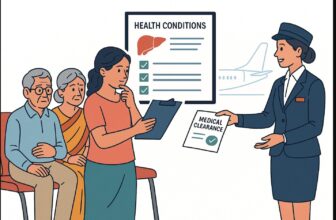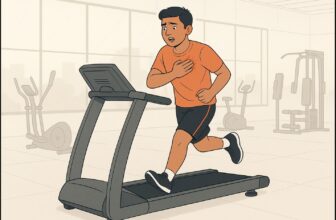You’ve had a rough day. Maybe work deadlines piled up, a family argument drained your energy, or you’re just feeling down. Suddenly, you’re reaching for a packet of chips or raiding the fridge for something sweet, even though you’re not actually hungry. Sound familiar?
You’re not alone. Emotional eating is a common response to stress, and in India, where food is comfort, culture, and connection, it’s easy to fall into this habit. But once you understand why this happens, you can start to take control.
Why You Eat More When You’re Stressed
Your Body Thinks You’re in Danger
When you feel stressed, your body releases a hormone called cortisol. It’s designed to keep you alert and ready to act. But there’s a side effect: cortisol also boosts your appetite, especially for high-calorie foods. That’s why stress often triggers cravings for fried snacks, sweets, or salty treats, the kind you’ll find in almost every Indian kitchen.
Food Feels Like a Quick Fix
Emotional eating isn’t about physical hunger. It’s about soothing yourself, you eat to feel better, not because your body needs fuel. Food brings temporary comfort by releasing dopamine, a feel-good chemical. But the relief doesn’t last. Afterward, you may feel guilty, sluggish, or even more stressed.
Real Hunger vs. Emotional Hunger
It’s easy to confuse the two, but there are clear signs:
- Emotional hunger comes on suddenly, often with specific cravings (e.g., “I need something crunchy or sweet right now”).
- Physical hunger builds gradually and is satisfied by regular meals.
Knowing the difference is your first step toward change.
What Stress Does to Your Body (And Why It Leads to Bad Habits)
When you’re under stress, whether it’s emotional, financial, or work-related, your body doesn’t know the difference between a real emergency and a frustrating day. It kicks into survival mode, activating your sympathetic nervous system, also known as the “fight or flight” response.
Here’s what happens inside your body:
- Your brain releases cortisol, the primary stress hormone.
- Your blood sugar rises to give you quick energy.
- Your digestive system slows down, because the body thinks survival is the priority.
- Your hunger signals go haywire , making you crave fatty, salty, and sugary foods.
- You may feel jittery, restless, anxious, or emotionally overwhelmed.
This state isn’t just uncomfortable, it’s harmful if it lasts too long.
Why Constant Stress Is a Problem for Your Health
If you keep turning to food every time stress strikes, your body stays trapped in this loop:
- More cortisol = more cravings
- More overeating = weight gain and sluggishness
- Less energy = more emotional lows
- Which leads to… more stress
Over time, this can raise your risk for:
- Obesity and type 2 diabetes
- Insulin resistance and digestive issues
- Sleep disturbances and mood disorders
- Poor immunity and low energy levels
And most importantly, it affects your relationship with food, you start eating for relief, not nourishment.
10 Science-Backed Fixes to Stop Emotional Eating
These tips are easy to apply in your everyday Indian routine, at home, at work, or even when you’re stuck in traffic.
1. Track What Triggers You
Keep a small journal or notes app where you jot down:
- What you ate
- When you ate it
- How you felt before and after
Over time, you’ll notice patterns. Maybe you always snack after office meetings or late at night when you’re alone. Once you spot the triggers, you can start breaking the loop.
2. Never Skip Breakfast (Or Any Meal)
Skipping meals makes your blood sugar dip, which increases cravings and irritability. And no, just chai isn’t a real breakfast. Start your day with something filling, like poha, idli with sambar, or curd with fruits. A steady meal schedule helps stabilize both your mood and appetite.
3. Use the HALT Technique Before Eating
HALT stands for: Hungry, Angry, Lonely, Tired
Ask yourself, “Am I any of these?” before you reach for food.
If you’re just angry or tired, try drinking water, stepping outside, or calling a friend instead. Give yourself 5–10 minutes to pause before eating, you’ll often skip the snack altogether.
4. Don’t Keep Temptation Within Reach
If chips, biscuits, or laddoos are within arm’s reach, chances are you’ll eat them. Out of sight, out of mind actually works.
Stock your kitchen or desk with:
- Roasted chana or makhana
- Fresh fruits
- Homemade khakhra
- Buttermilk or coconut water
When you’re ready to snack, make the better choice the easier choice.
5. Move, Don’t Munch
Physical activity releases endorphins, which naturally lift your mood and reduce stress. You don’t need a gym, just stretch, take a brisk walk, do 5 minutes of yoga, or dance around your room.
Even short bursts of movement help interrupt emotional eating.
6. Drink Water First
Dehydration often feels like hunger. So, the next time you’re reaching for a snack, have a glass of water first.
Pro tip: Keep a sipper bottle with you, and add lemon or tulsi if plain water feels boring.
7. Eat Without Screens
When you eat while watching a reel, TV show, or scrolling news, your brain misses the satisfaction signal. You end up eating more, and enjoying it less.
Sit down with your food, even if it’s just a bowl of sprouts. Notice the texture, the spice, the crunch. That’s mindful eating, and it works.
8. Create a No-Food Relaxation Habit
Stress doesn’t disappear when you stop snacking, you need a replacement.
Pick one non-food activity that helps you unwind:
- Listening to calming music
- Drawing, writing, or doodling
- Doing deep breathing for 5 minutes
- Lighting incense or using aroma oils
Build a daily habit around it, especially in your most stressful time of day.
9. Sleep Enough to Beat Late-Night Cravings
Lack of sleep increases ghrelin, the hormone that makes you hungry. It also lowers leptin, the one that tells you you’re full.
Translation? Sleep less, crave more.
Try this:
- Avoid chai/coffee after 6 pm
- Turn off screens 30 minutes before bed
- Sleep at the same time each night
Aim for 7 to 8 hours. Your brain, body, and cravings will thank you.
10. Don’t Fight This Alone
Sometimes, willpower isn’t enough, and that’s okay. Talk to a friend, join a support group, or speak to a professional.
If stress, anxiety, or past trauma are behind your eating habits, therapy can help you manage the root cause, not just the symptom.
It’s Not About Giving Up Food, It’s About Listening to Your Body
You don’t have to quit snacking forever. You just need to know why you’re eating and what your body is actually asking for.
By becoming more aware of your emotional triggers, building better routines, and staying kind to yourself in the process, you’ll gradually shift from reacting to responding, and that’s how lasting change begins.
You’re not trying to be perfect. You’re learning to be present, and that’s enough.





